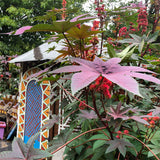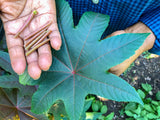Red Castor
Ricinus communis
***** WARNING: Do not eat! *****
Native to Africa, this tall, strikingly beautiful plant is often grown for its dramatic visual effect in the garden. This variety is 10-12' tall, red-stemmed, with giant, veined red leaves, and red flowers. At Sankofa Community Farm, where this seed was grown for our catalog, it is part of their African Diaspora Garden, where they pay tribute to the important plants from the mother continent.
Ricin is the toxic chemical in the 'bean,' which is not a legume but a euphorbia. Eating 4-8 seeds could kill a human, but it would take 80 to kill a duck. However, these seeds can be made into castor oil, which has a variety of uses including as medicine (especially in the Southern US), packaging, coatings, and biodiesel. Seeds from 4000 BC were found in tombs in Egypt, where its oil was used for lighting lamps.
In our Seeds and Their People podcast, our friend Doña Iris Brown of Norris Square Neighborhood Project says: "my grandmother, she would take a leaf, she would cut it, and when you have pain (back pain, pain on your neck) she would put vicks or another ointment and then she'd warm up the leaf and put it on the ointment. She would take a piece of material and tie it there to hold the leaf against the ointment on your skin." Her grandmother would also cut the leaf stem into pieces and string them up to be worn like a necklace to relieve pain.
Note: Some gardeners may want to remove and dispose of any seeds that develop on the plant to keep them away from children or pets. Seeds are poisonous and should not be consumed.
Days to maturity: n/a
Seeds per pack: 10
Germination rate: Untested Botanical Sample
Planting / harvesting notes
Direct sow after the last frost or start indoors 6-8 weeks before last frost. This species is perennial in Zones 8-10, and annual elsewhere.
Seed keeping notes
Collect seeds when fully mature and dried on the plant. You will see their dark brown and light brown patterns when mature, and the seed pod will be crispy dry. Allow to dry further in a well ventilated place. Again, keep seeds away from pets and children, as they are poisonous if consumed.









